BTC is etching daily higher lows and altcoins are holding on to their recent gains, suggesting that a market bottom could be in place.
The U.S. equity markets and Bitcoin (BTC) have rebounded sharply from their Feb. 24 lows while gold has made a retreat from its recent highs. This indicates that investors may be buying risky assets and reducing exposure to assets perceived as a safe haven.
Recent reports also suggest that Russian President Vladimir Putin may send a delegation to negotiate with Ukraine and this raises hope that the conflict could end sooner than analysts expect.
Some analysts believe that the U.S. Federal Reserve may not raise rates aggressively in March due to the geopolitical situation. Allianz chief economic advisor Mohamed El-Erian believes that the March 50 basis point rate hike is “completely off the table.”
Dr. Raullen Chai, the co-founder and CEO of blockchain network IoTeX, told Cointelegraph that investors should refrain from selling their crypto holdings with the expectation of buying again at a lower price. He cautioned that the market could “easily reach new all-time highs by the end of the year.”
Could bulls build upon the strong bounce off the lower levels or will bears sell at higher levels and pull the price down? Let’s analyze the charts of the top-10 cryptocurrencies to find out.
BTC/USDT
Bitcoin formed an outside-day candlestick pattern on Feb. 24. The bears pulled the price below the immediate support at $36,250 but the long tail on the day’s candlestick indicates strong buying by the bulls at lower levels.
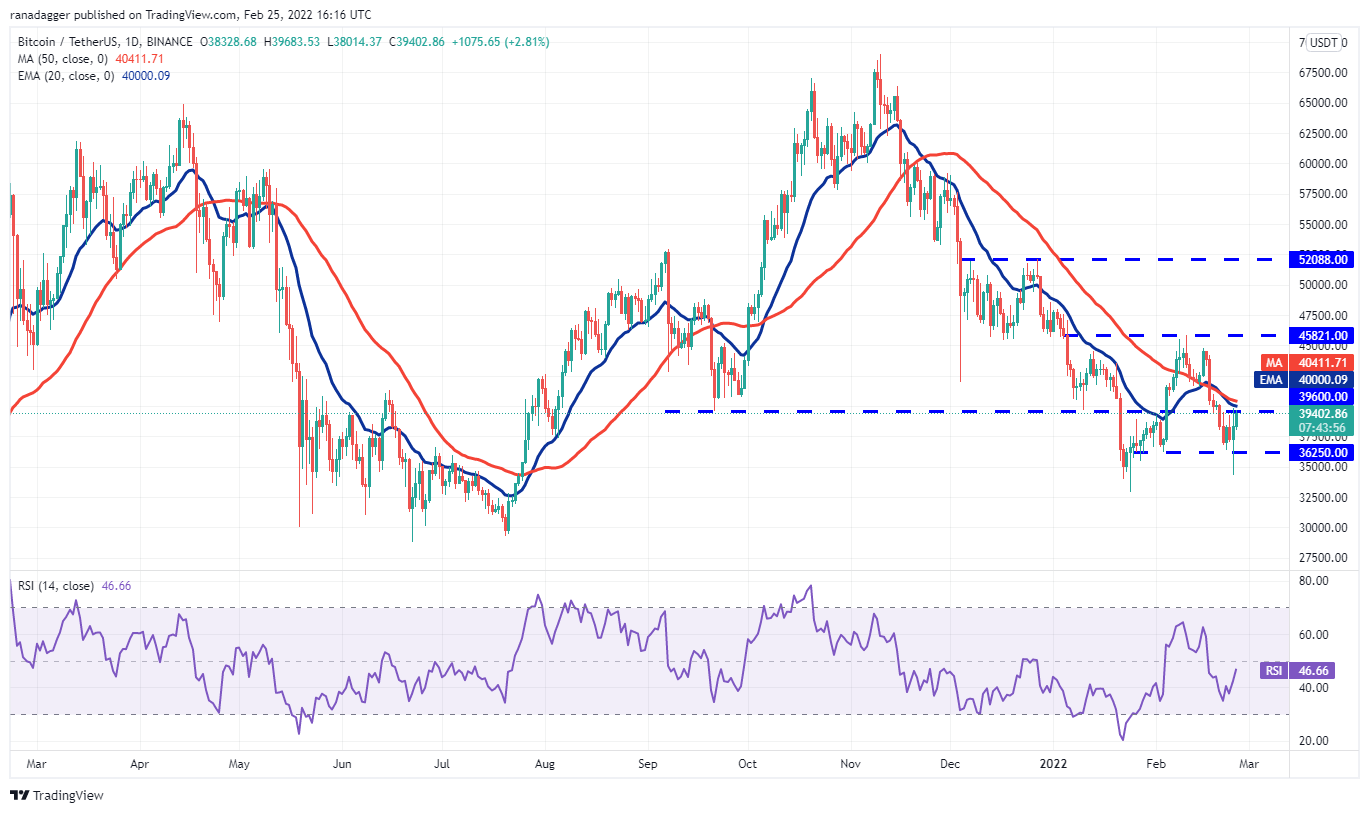
If buyers push the price above the moving averages, the BTC/USDT pair could rally toward the overhead resistance at $45,821. Such a move will suggest that the bears may be losing their grip. The longer the price sustains above the moving averages, the greater the possibility that a bottom has been made.
Conversely, if the price turns down from the moving averages, it will suggest that the sentiment remains negative and traders are selling on rallies. The bears will then make one more attempt to sink and sustain the pair below $36,250. If they manage to do that, the pair could drop to the strong support zone between $34,322 and $32,917.
ETH/USDT
Ether (ETH) broke below the support line of the symmetrical triangle on Feb. 24 but the bears could not sustain the lower levels. The long tail on the day’s candlestick indicates strong buying at lower levels.
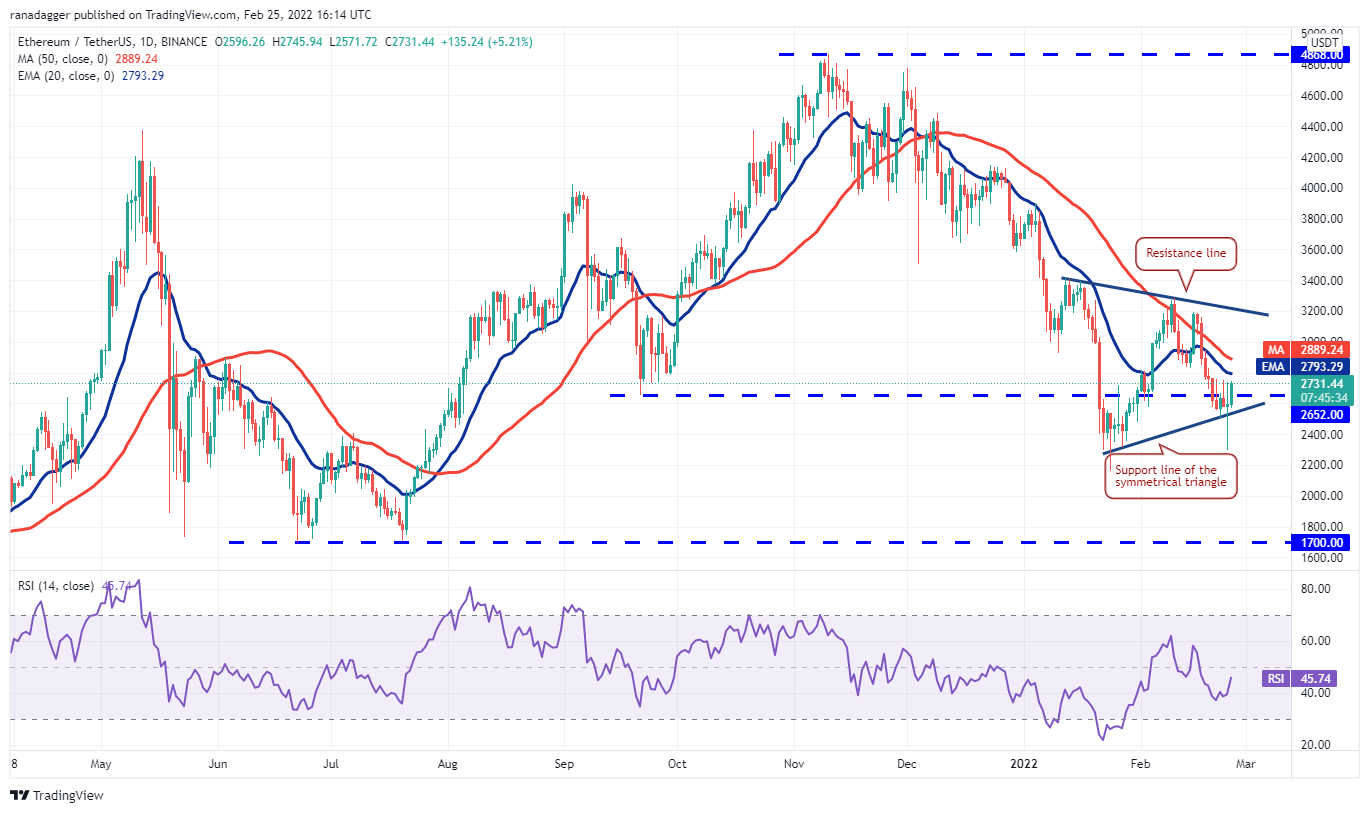
The ETH/USDT pair has re-entered the triangle and the bulls are attempting to push the price above the moving averages. If they succeed, the pair could rise to the resistance line of the triangle. A break and close above this level could indicate the start of a new possible uptrend.
Contrary to this assumption, if the price turns down from the moving averages, the bears will again try to pull the pair below the support line of the triangle. If that happens, the pair could retest $2,300. If this support also cracks, the decline could extend to $2,159
BNB/USDT
Binance Coin (BNB) plummeted to the strong support zone at $330 to $320 on Feb. 24 where the buyers stepped in and arrested the decline. The strong rebound pushed the price back above the breakdown level at $350.
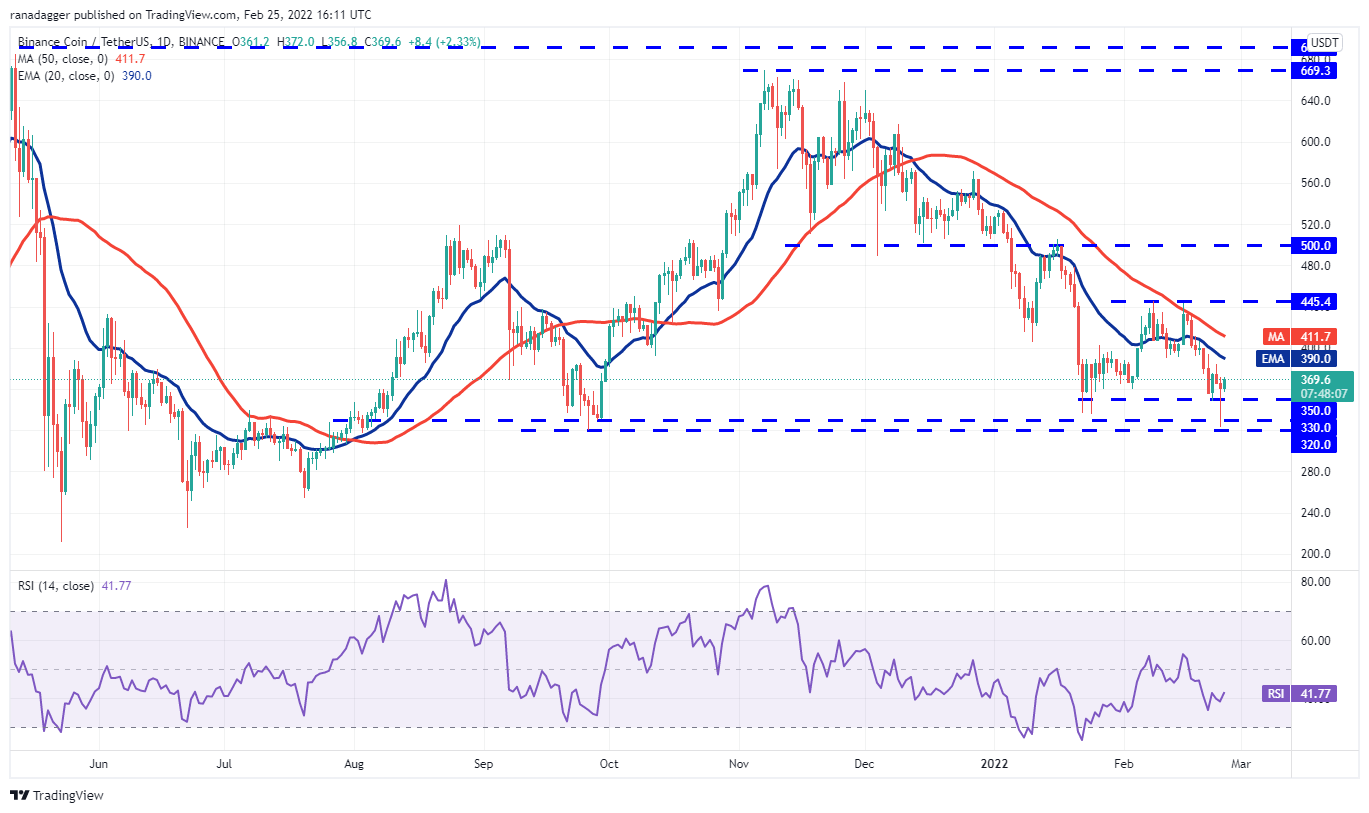
The bulls are attempting to propel the price to the moving averages where the bears are expected to mount a strong defense. If the price turns down from the moving averages, the bears will again attempt to sink and sustain the BNB/USDT pair below $350 and challenge the support zone.
Alternatively, if bulls drive the price above the 50-day simple moving average ($411), it will suggest that the selling pressure could be reducing. The pair may then rally to the overhead resistance at $445.
XRP/USDT
Ripple (XRP) rebounded off the $0.62 support on Feb. 24 but the bulls could not push the price above the overhead resistance at the 50-day SMA ($0.72). This resulted in the formation of a long-legged Doji candlestick pattern.
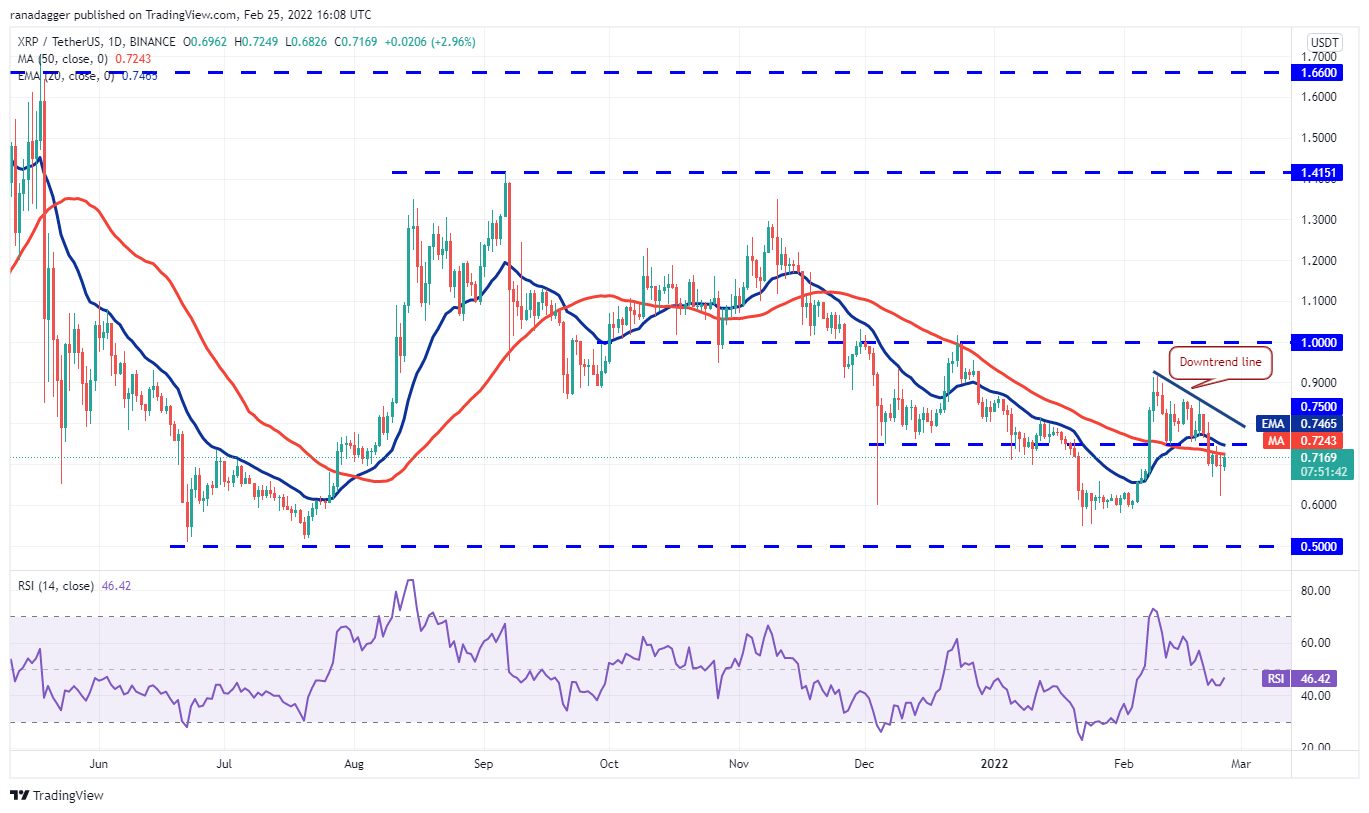
The bulls are again attempting to drive the price above the moving averages. If they manage to do that, the XRP/USDT pair could rally to the downtrend line. The bulls will have to clear this hurdle to signal a possible change in the short-term trend. The pair could then attempt an up-move to $0.91 and later to $1.
Conversely, if the price turns down from the moving averages, it will suggest that bears continue to sell on rallies. The bears will then resume their selling and try to pull the pair to the strong support zone at $0.62 to $0.55.
ADA/USDT
Cardano (ADA) continues to be in a strong downtrend and the price has been trading below the critical level at $1 for the past few days. The long tail on Feb. 25 candlestick shows that bulls bought the dip to $0.74.
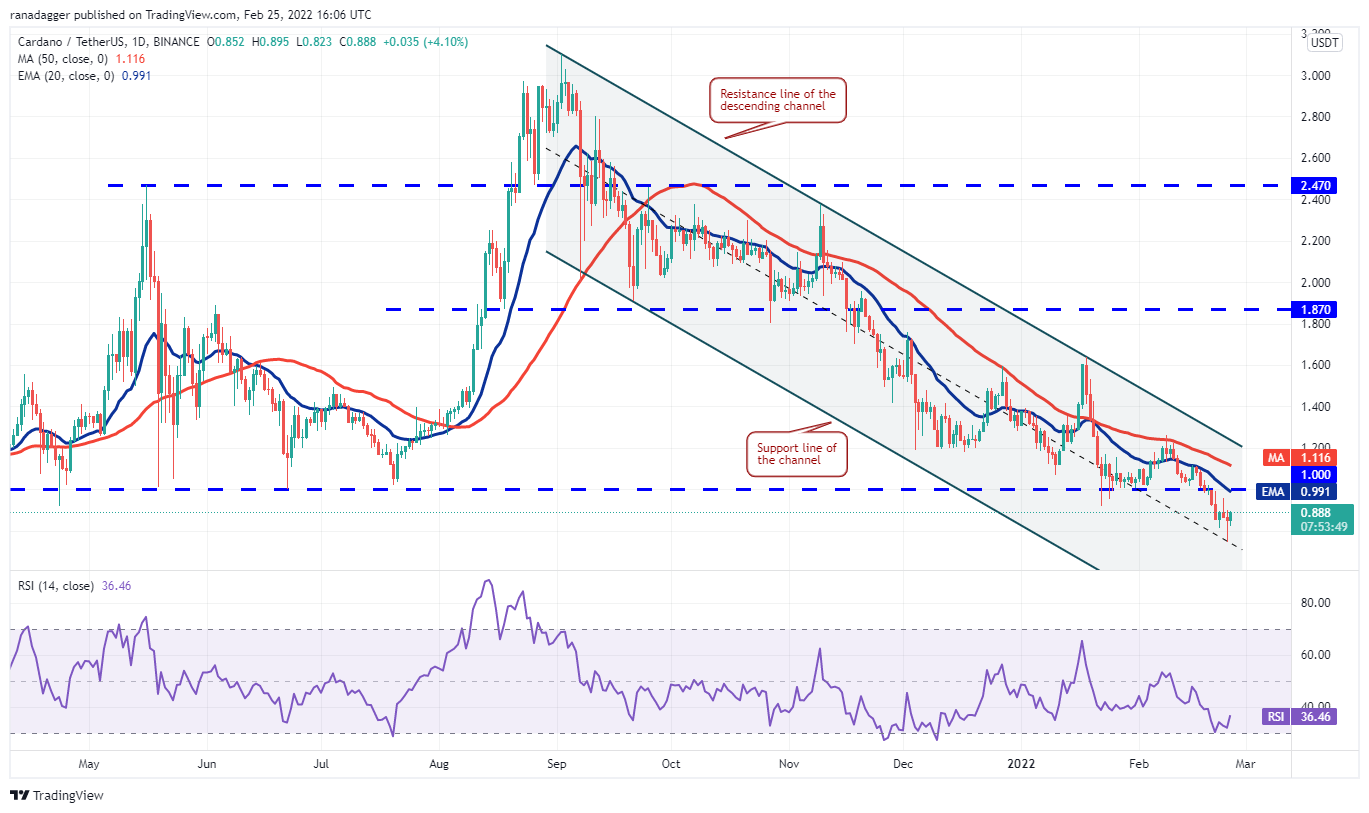
The downsloping moving averages and the relative strength index (RSI) below 37 suggest that bears are in control. If the price turns down from the current level or the overhead resistance at $1, it will suggest that bears continue to sell on rallies. The bears will then attempt to pull the pair below $0.74.
Conversely, if the price breaks above $0.90, the pair could rise to the breakdown level at $1. This is an important level for the bears to defend because a break above it will indicate that the markets have rejected the lower levels. The pair could then challenge the resistance line of the descending channel.
SOL/USDT
Solana (SOL) recovered sharply from the intraday low on Feb. 24 and closed above the breakdown level at $81. The long tail on the day’s candlestick shows strong buying at lower levels.
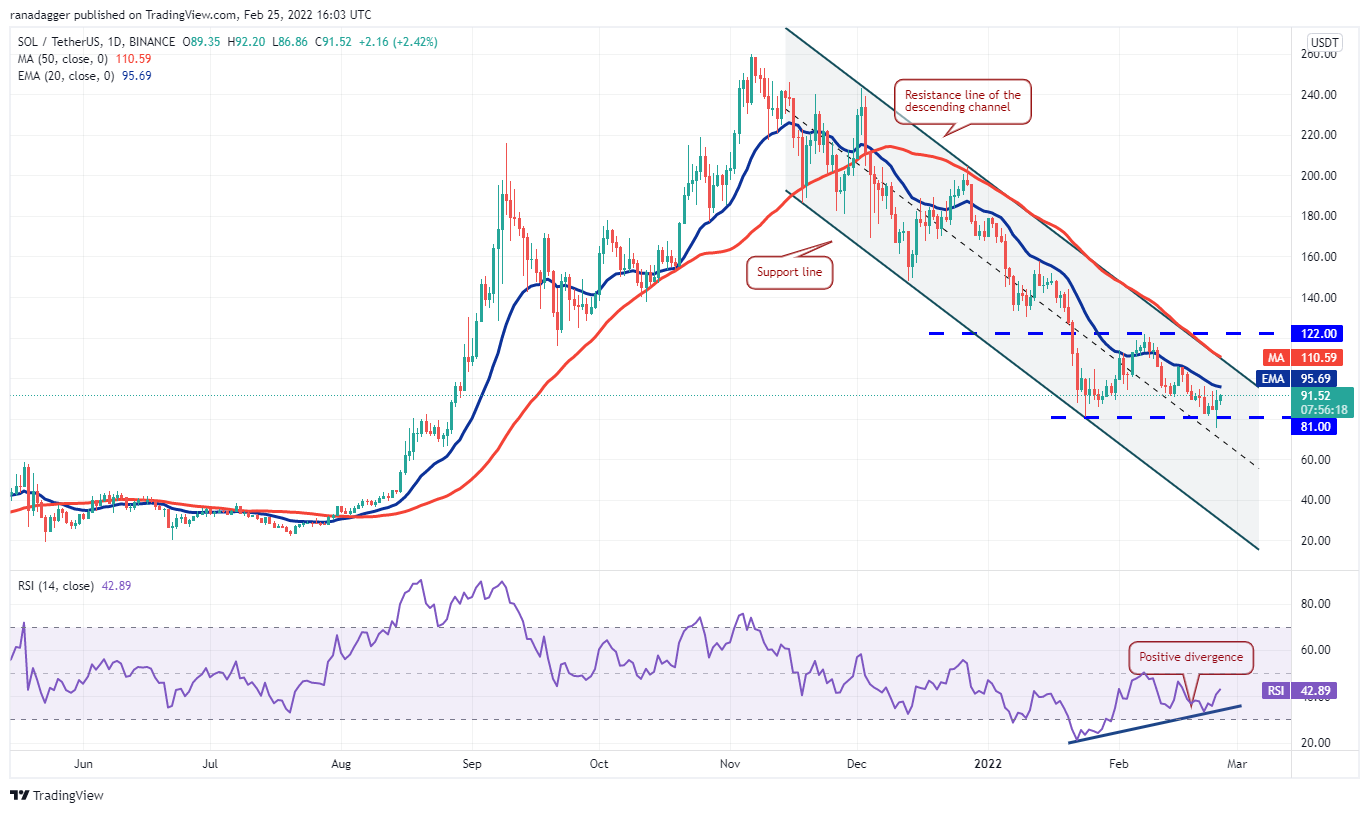
The bulls will have to clear the overhead hurdle at the 50-day SMA ($110) to indicate that the selling pressure could be reducing. The SOL/USDT pair could thereafter rally to the overhead resistance at $122.
A break and close above this level will complete a double bottom pattern, which has a pattern target at $163.
Alternatively, if the price turns down from the current level, the bears will challenge the strong support at $81 and attempt to resume the downtrend. The selling pressure could increase on a break and close below $75.
AVAX/USDT
Avalanche (AVAX) attempted to rise above the moving averages on Feb. 23 but the long wick on the day’s candlestick indicates strong selling at higher levels. The bears pulled the price to $64 on Feb. 24 but the bulls bought this dip. This suggests that bears are selling on rallies while bulls are buying on dips.
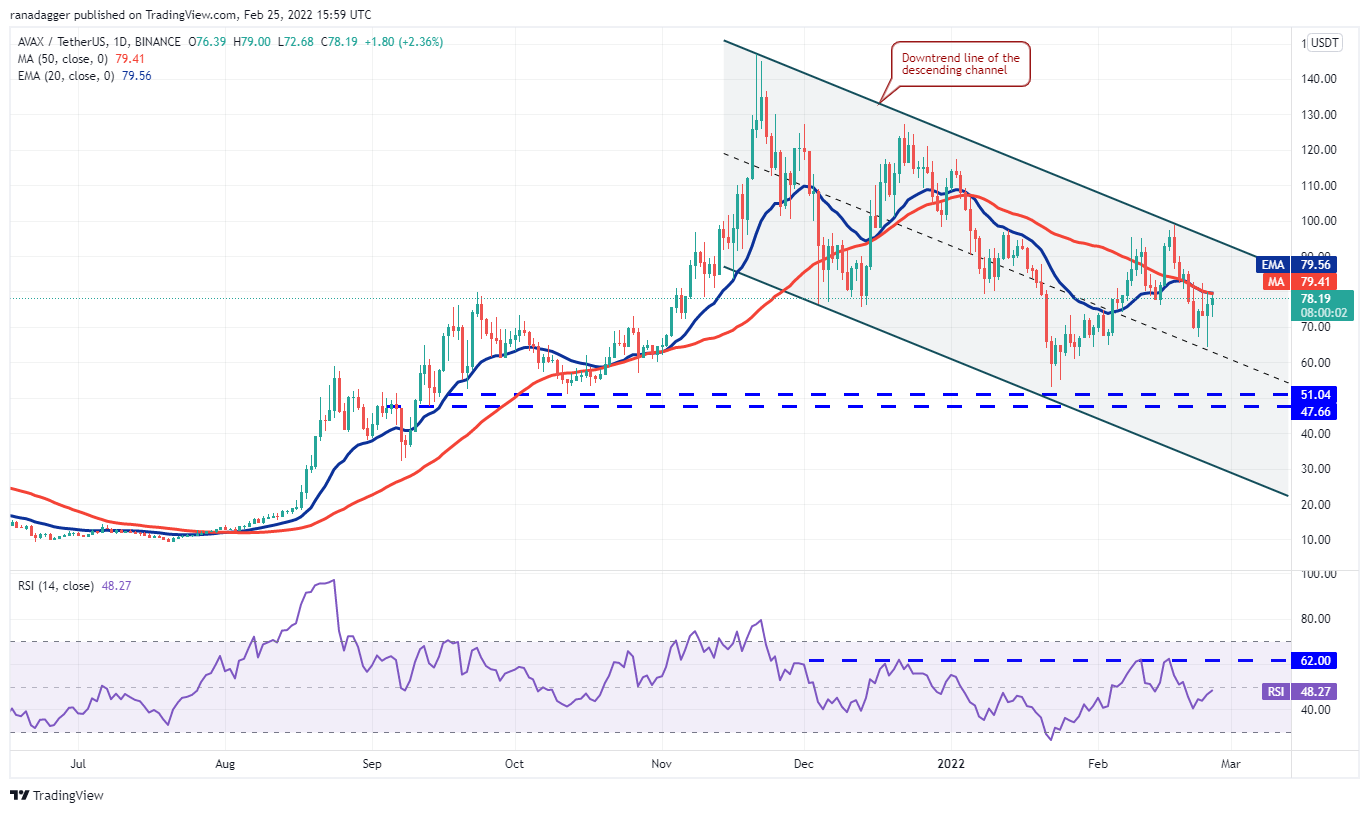
Both moving averages are sloping down and the RSI is just below the midpoint, indicating a minor advantage to bears. If the price remains below the moving averages, the AVAX/USDT pair could retest $64. A break and close below this level could open the doors for a possible fall to $51.
Conversely, if bulls push the price above the moving averages, the pair could rise to the downtrend line of the channel. A break and close above this level will indicate a possible change in trend.
Related: Bitcoin whales fuel BTC price comeback as stocks brush off Russia-Ukraine shocks
LUNA/USDT
Terra’s LUNA token formed an outside-day candlestick pattern on Feb. 24. Although the bears pulled the price back below the 20-day exponential moving average ($56), they could not sustain the lower levels.
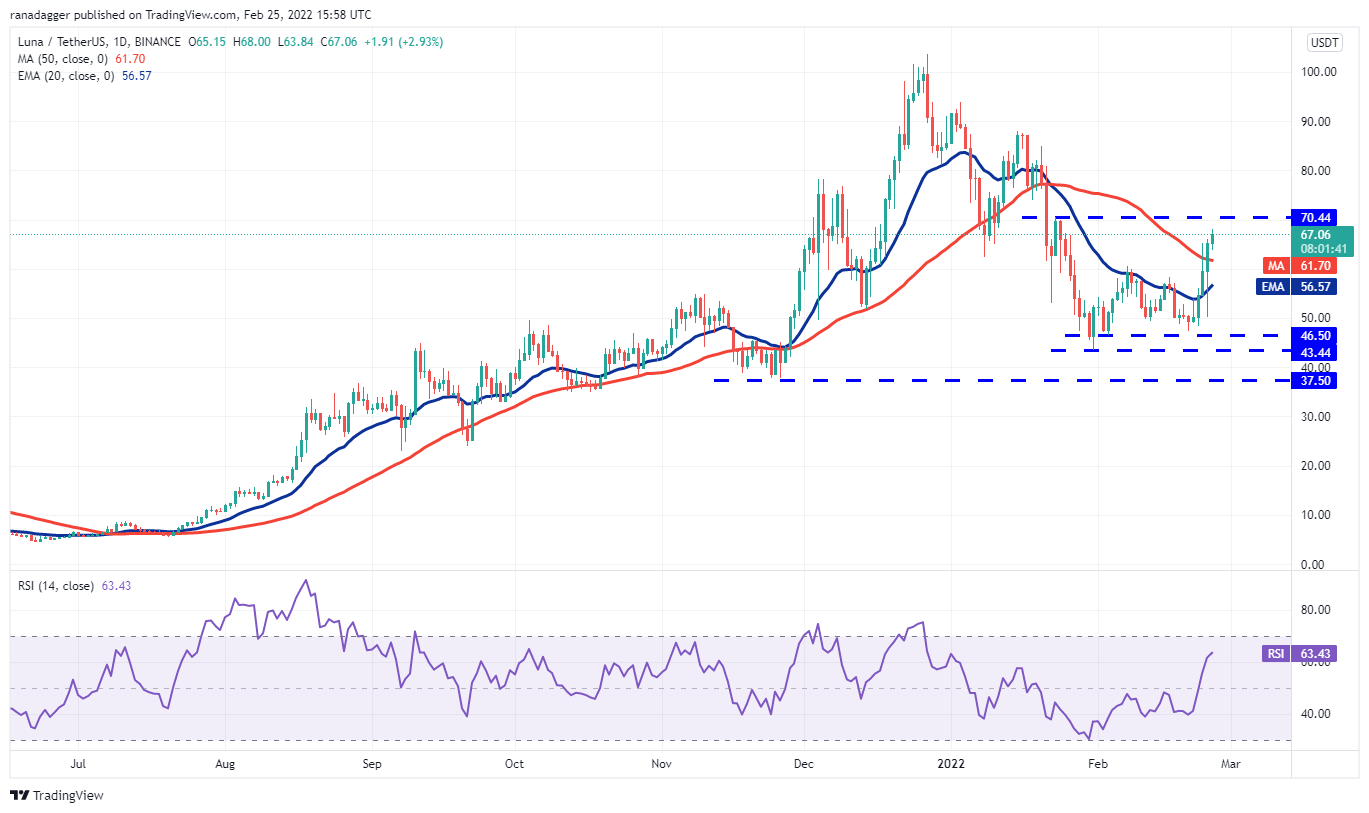
The LUNA/USDT pair recovered sharply from the lows and closed above the 50-day SMA ($61). This indicates aggressive buying on dips. The 20-day EMA has started to turn up and the RSI is in the positive territory, indicating that bulls have the upper hand.
There is a minor resistance at $70. If bulls clear this hurdle, the pair could rally to the overhead zone at $85 to $87. Conversely, if the price turns down from $70, the pair could drop to the moving averages.
DOGE/USDT
Dogecoin (DOGE) rebounded off the strong support at $0.10 on Feb. 24 and closed above the breakdown level at $0.12. However, the bulls have not been able to sustain the buying momentum, indicating a lack of demand at higher levels.
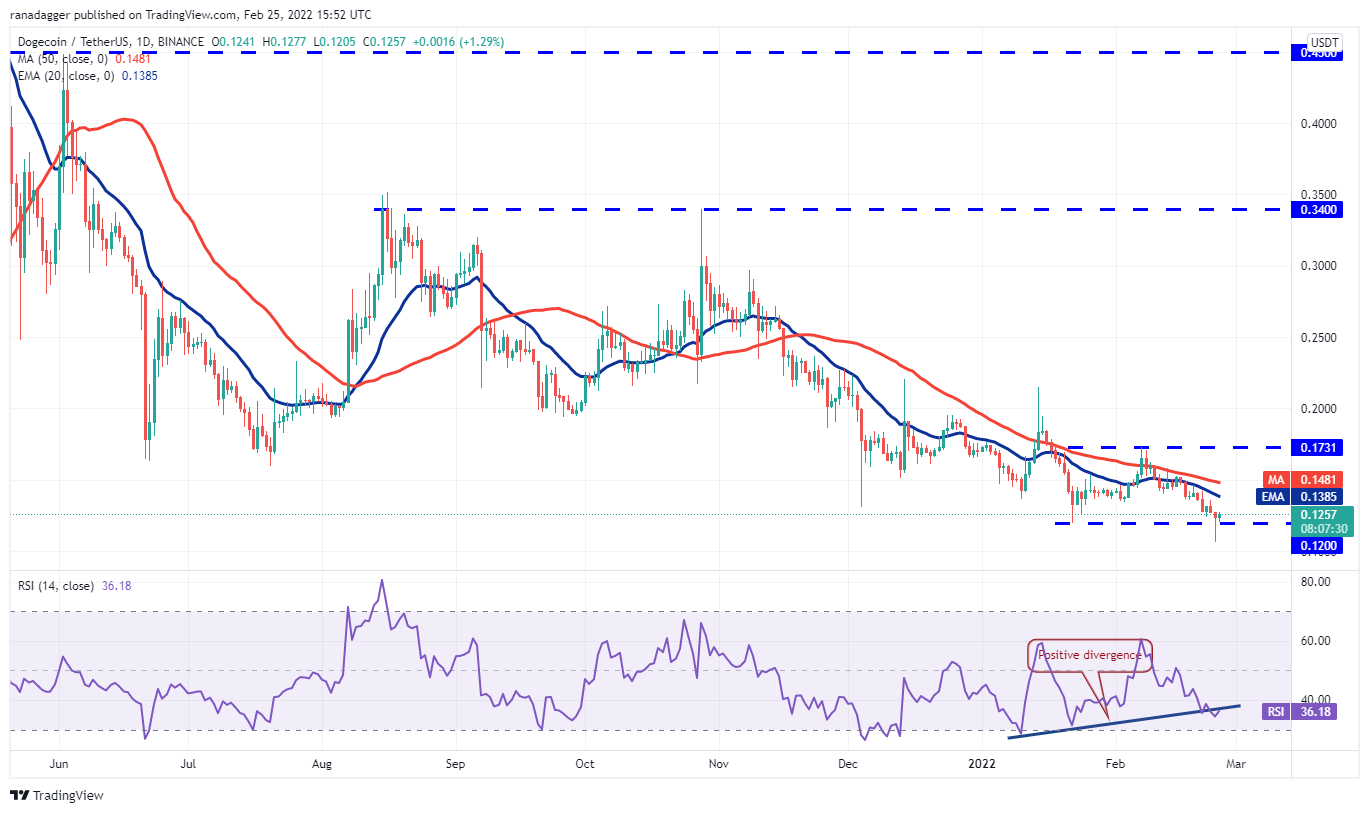
The bears will again try to pull the price below $0.12 and challenge the psychological support at $0.10. A break and close below this level will be a huge negative and the DOGE/USDT pair could decline to $0.06.
Alternatively, if the price turns up from the current level, the buyers will attempt to push the pair above the moving averages. If they do that, the pair could rally to the stiff overhead resistance at $0.17. A break and close above this level will signal that the bears may be losing their grip.
DOT/USDT
Polkadot (DOT) plunged below the strong support at $15.80 on Feb. 24 but the bears could not sustain the lower levels, as seen from the long tail on the day’s candlestick. This indicates strong buying at lower levels.
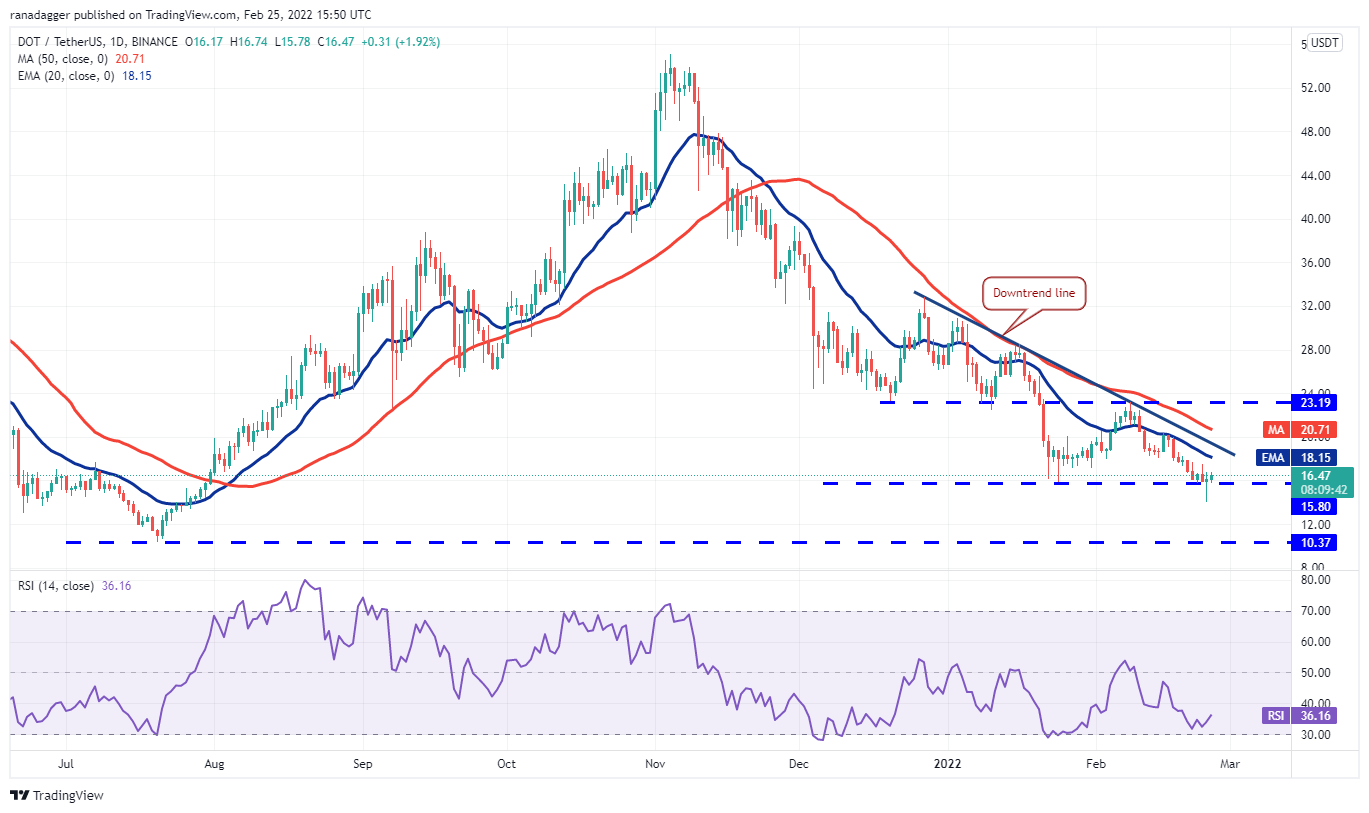
The downsloping moving averages and the RSI in the negative territory indicate that bears have a slight edge. The bears are likely to mount a strong defense in the overhead zone between the 20-day EMA ($18.15) and the downtrend line.
If the price turns down from this zone, the bears will make one more attempt to pull and sustain the DOT/USDT pair below the strong support at $15.80. If they succeed, the pair could drop to $13.35.
This negative view will invalidate if the price rises and sustains above the 50-day SMA ($20.71). The pair could then rise to the overhead resistance at $23.19.
The views and opinions expressed here are solely those of the author and do not necessarily reflect the views of Cointelegraph. Every investment and trading move involves risk. You should conduct your own research when making a decision.
Market data is provided by HitBTC exchange.



